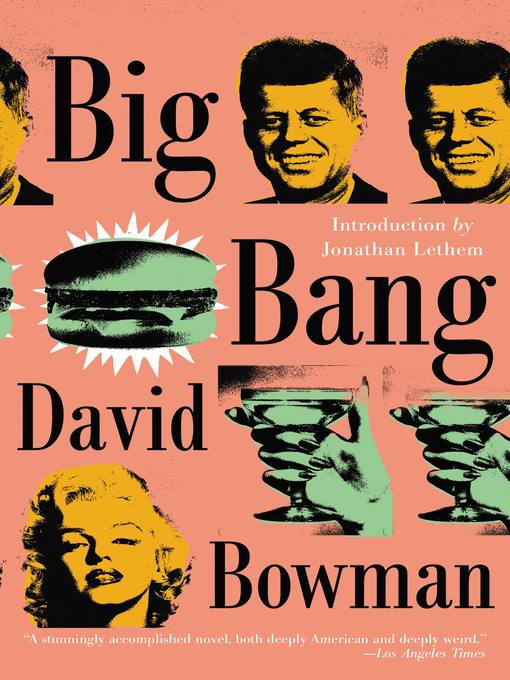Where were you when you first heard President Kennedy had been shot? This is a question most people can answer, even if the answer is "I wasn't born yet." In this epic novel, David Bowman makes the strong case that the shooting on November 22nd, 1963 was the major, defining turning point that catapulted the world into an entirely new stratosphere. It was the second big bang.
In this hilarious, lightning-fast historical novel, Bowman follows the most famous couples of the decade as their lives are torn apart by post-war's new normal. We see Lucille Ball's bizarre interrogation by the House UnAmerican Activities Committee and Jackie Onassis' moonlight cruise with Frank Sinatra . We follow Norman Mailer and Arthur Miller as they attempt to get quickie divorces together at a loophole resort in Nevada and watch a young Howard Hunt snoop around South America with the newly founded CIA. A young Jimi Hendrix, now the epitome of counterculture cool, tries his luck as a clean cut army recruit.
Written with an almost documentary film like intensity, BIG BANG is a posthumous work from the award-winning author of Let the Dog Drive. A riotous account of a country, perhaps, at the beginning of the end.
-
Creators
-
Publisher
-
Release date
January 15, 2019 -
Formats
-
OverDrive Read
- ISBN: 9780316560221
-
EPUB ebook
- ISBN: 9780316560221
- File size: 2281 KB
-
-
Languages
- English
-
Reviews
-
Kirkus
Starred review from January 15, 2019
A kaleidoscopic portrait of America in the years leading up to the assassination of John F. Kennedy--and a chillingly prophetic vision of how we got to where we are.This is a novel that Bowman, the author of Let the Dog Drive (1992) and two other books, left unpublished when he died of a cerebral hemorrhage in 2012. But unpublished does not mean incomplete. Bowman articulates a vivid point of view in this novel, or, more accurately, a series of points of view, beginning with a prologue in which a variety of historical figures (Norman Mailer; Elvis; J.D. Salinger's young daughter, Margaret) react to the killing of the president. From there, the action shifts to Mexico City in 1950 and the confluence of some unlikely expatriates, including William S. Burroughs and E. Howard Hunt. "The novel you are about to read is true," Bowman writes. "All the people who are mentioned--just as Bob Dylan sang--I had to rearrange their faces and give them all another name. Still, this novel is true history." What Bowman is saying is that history is itself a story, one we tell as much as live. His juxtapositions of incidents and individuals are, in that sense, as much constructions of his imagination as they are mashups of overlapping events. Albert Camus and Maria Callas carry on an affair. JFK and Aristotle Onassis commiserate--and strategize--over the Kennedys' stillborn child. Bowman is sly about acknowledging his inspirations: Mailer, as established in the opening, and also Don DeLillo, whose Underworld this novel resembles and who appears as a young advertising copywriter. And yet, to call the book derivative is to miss the point. Instead, it is sui generis, the kind of novel that invents its form out of its own frenzied convocation of voices and moments: the 20th century in all its majesty and fear.Bowman's testament is both lament and celebration--for the betrayed promise of the United States as well as the tragedy of the author's premature demise.COPYRIGHT(2019) Kirkus Reviews, ALL RIGHTS RESERVED.
-
Library Journal
Starred review from January 1, 2019
It's the 1950s, brought back to life, treating well- and little-known adventures of virtually all the main players. Among them: spook/B-novelist Howard Hunt (always plotting), William S. Burroughs (shoots wife in head), Marilyn Monroe (sympathetic, conflicted), JFK (trystmaster, including a one-nighter with Monroe in Bing Crosby's mansion), Jackson Pollock (howls some lyrics from a Stones song written a decade later while painting a red door black), Richard M. Nixon (thinking himself president-elect, takes off on a lark to Tijuana postelection day), Montgomery Clift (face-shattering accident), Dr. Spock (institutionalizes wife), and Buster Hendrix (later Jimi, in the army). Plus many, many more. Refreshingly, but unusually since the 1700s, the author comes out of the text at times to comment. There's a small Pt. 2 that takes in the early Sixties, ending in a significant treatment of the Kennedy assassination in the penultimate chapter, not surprisingly coming to a conclusion quite different from the Warren Commission's. VERDICT Bowman's posthumous novel is a masterpiece, certainly long but never tedious because of the rapid focus changes. For full effect, however, readers will need better than a passing knowledge of the political and social climate of the Fifties. [See Prepub Alert, 7/19/18.]--Robert E. Brown, Oswego, NY
Copyright 1 Library Journal, LLC Used with permission.
-
Loading
Why is availability limited?
×Availability can change throughout the month based on the library's budget. You can still place a hold on the title, and your hold will be automatically filled as soon as the title is available again.
The Kindle Book format for this title is not supported on:
×Read-along ebook
×The OverDrive Read format of this ebook has professional narration that plays while you read in your browser. Learn more here.


